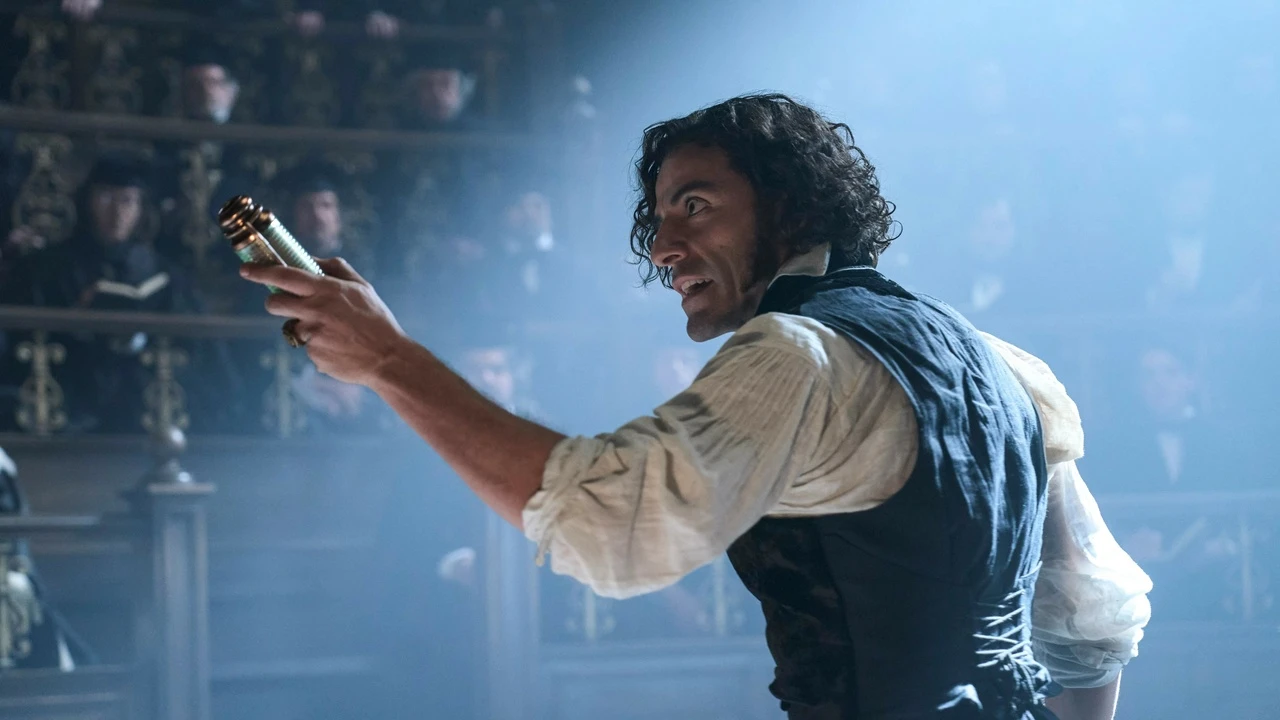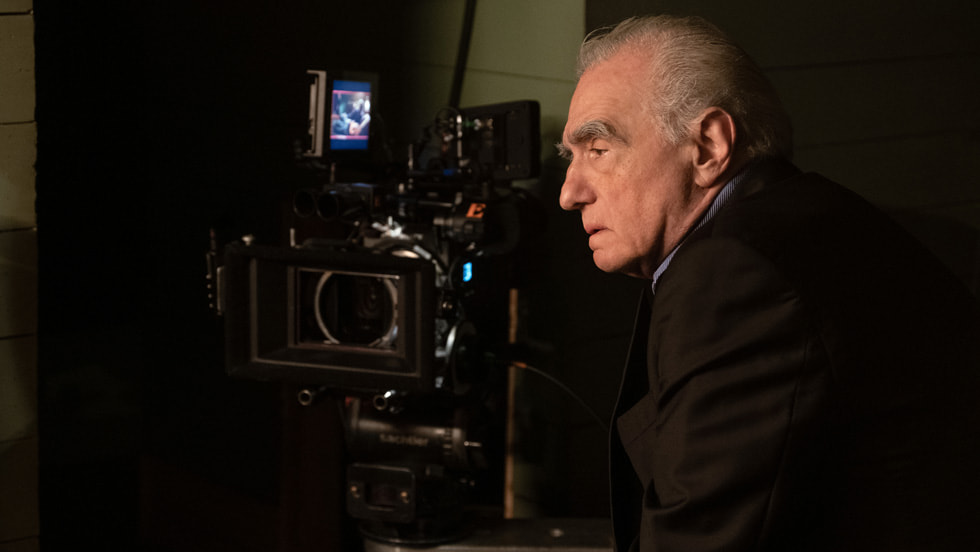Wintry, chilling, and captivating, Guillermo Del Toro’s adaptation of Mary Shelley’s Frankenstein is a breathtaking retelling of the classic two-century-old novel; it’s a horror movie that feels Shakespearian in just how dramatically charged it is. The film also has so many macabre moments, but the emotional center is Del Toro’s focus, and he prevails with Frankenstein.
The film’s setting is in the late 18th century, and it begins in the Arctic Ocean, where Captain Anderson’s (Lars Mikkelsen) ship is trapped in an iceberg with his crew members during their expedition. The crew ends up rescuing a severely injured Victor Frankenstein (Oscar Isaac) while breaking through the ice, and they bring him aboard the ship. Shortly after, the ship is attacked viciously by a massive creature (Jacob Elordi) that has superhuman strength and can heal its wounds. Captain Anderson and his crew rush Victor to the bridge room. While being treated and resting, Victor explains how he created the creature and recollects the events that led to its creation.

Through these flashbacks, we are introduced to a young Victor (Christian Convery), who is raised by Baron Leopold Frankenstein (Charles Dance), Victor’s strict and domineering father and renowned physician, who pushes young Victor to know everything about human anatomy, health, and sciences. At their home, Victor’s mother, Baroness Claire Frankenstein (Mia Goth plays dual roles), dies during labor. Years pass by, and we see Baron Frankenstein growing distant with Victor as most of his attention goes to young William Frankenstein.
Cut to 25 years later, and the Baron has passed away, and Victor carries on the notoriety of his father’s name of being a physician and professor, but his teachings and methods are very unorthodox. After being traumatized by death from the loss of his two parents, Victor makes it a lifelong goal to evade death. He ends up putting together the remains of a dead body and uses electricity to bring the dead corpse alive during a presentation. Upon getting fired, Victor encounters an arms merchant named Henrich Harlander (Christoph Waltz), who offers Victor funding and a facility to conduct his experiments in. Henrich is also ailing and suffers from syphilis that is quickly spreading throughout his body. Victor ends up reconnecting with his brother William (Felix Kammerer) to assist in assembling the laboratory. William ends up getting engaged to Henrich’s niece Elizabeth (Mia Goth), with whom Victor feels an emotional connection. Elizabeth rejects his advances even though she feels a spark as well.

Meanwhile, Henrich pushes Victor to quickly animate the corpse. Victor ends up harvesting various body parts from hanged criminals and dead soldiers from the Crimean War. As he did during the presentation, Victor engineers electric currents and shocks from a thunderstorm to go through the lymphatic system, heart, and brain. Right when the experiment is to occur, Henrich begs Victor to animate his body as it’s dying in hopes the experiment can lead to his own immortality. Victor ends up animating the creature (Jacob Elordi) during the storm. He teaches the creature to say his name of “Victor,” and he chains him up in a dungeon below the mansion. The Creature has superhero strength, and Lead and Elordi are both terrifying and vulnerable in their scenes. Turning in a bodacious performance that is very singular on its own Turning in one of Boris Karloff’s beloved performances in James Whale’s Frankenstein. Especially the scenes of the Creature drifting into the hovel of a house where he observes an elderly blind man of wisdom that teaches his granddaughter how to read. The exchanges between Elordi and the elderly man, along with his interaction with Claire, are key reminders of how Guillermo Del Toro brings a human element into his framework of creatures, monsters, and the macabre with moving results. The Creature is an outsider, displaced by society, and disowned by his creator.
Now, there are some pacing issues in areas for Frankenstein, where there are many elements that hint at greatness as other moments feel bogged down and uneven. Oddly, the third act of the Creature and Victor chasing each other doesn’t have quite the gripping impact as you would hope. Mia Goth’s character also feels slightly underwritten. James Whale’s masterful Frankenstein from 1931 was only 70 minutes, but it captured all the key elements of Mary Shelley’s Frankenstein, while James Whale brought his own vision and sensibilities that made it feel so personal. Del Toro also captures the same impulses, keeping everything to his own personal style as well. It’s rather remarkable just how imaginative Del Toro can be with such a familiar story. There is no doubt that Del Toro’s Frankenstein feels refreshing with its highly stylized look and astonishing production values. The gloomy, expressionist-influenced style is upheld very well thanks to the art direction by Tamara Deverell and cinematography by frequent Del Toro DP Dan Laustsen. The aesthetics deliver a visceral impact. What’s fascinating about the setting is characters remain confined in their settings for long stretches of time, whether it’s in the ship, the laboratory, or the hovel house. Out of all the Frankenstein films, this one feels the most wintry and dreary. Some of the CGI involving a pack of wolves attacking sheep and even the creature looks synthetic.

Courtesy Netflix
The true showcase performance of the film is Jacob Elordi; coming off from being cast as Elvis in Sofia Coppola’s Priscilla, he has the perfect physique and emotional range that gives the Frankenstein Monster such an emotional center. It’s certainly in piece with other Del Toro films like The Shape of Water and Pan’s Labyrinth. Del Toro has always been drawn to the dark and macabre, but he always brings an emotional core to movies that end up becoming more engaging than scary. A viewing of Frankenstein might divide horror fans who are looking more for the horror, but Del Toro’s brings a human longing and shimmers of hope to the stunning material. Overall, Del Toro’s handling of the classic source material is haunting, patient, engaging, and unflinching.
Frakenstein is now playing in theaters, and it will be streaming on Netflix on November 7.









One of my very more anticipated films of the year
This looks really interesting!
Great review sounds like an exciting film with a cool atmosphere
Guillermo Del Toro has made the definitive “ Frankenstein movie. It’s faithful to Mary Shelly’s classic that created Science Fiction, and it has all of the raw emotion and power the way the story was meant to be. I hope Jacob Elordi get’s and Oscar nomination. He’s performance redefines how we will view the Creature. I will be seeing this again.